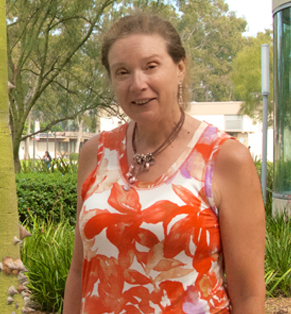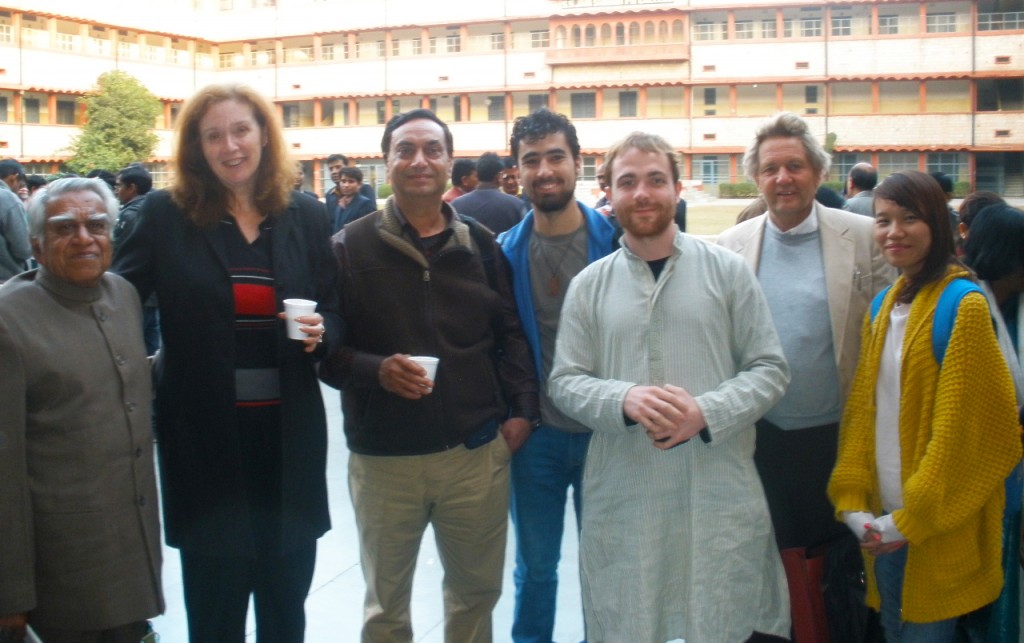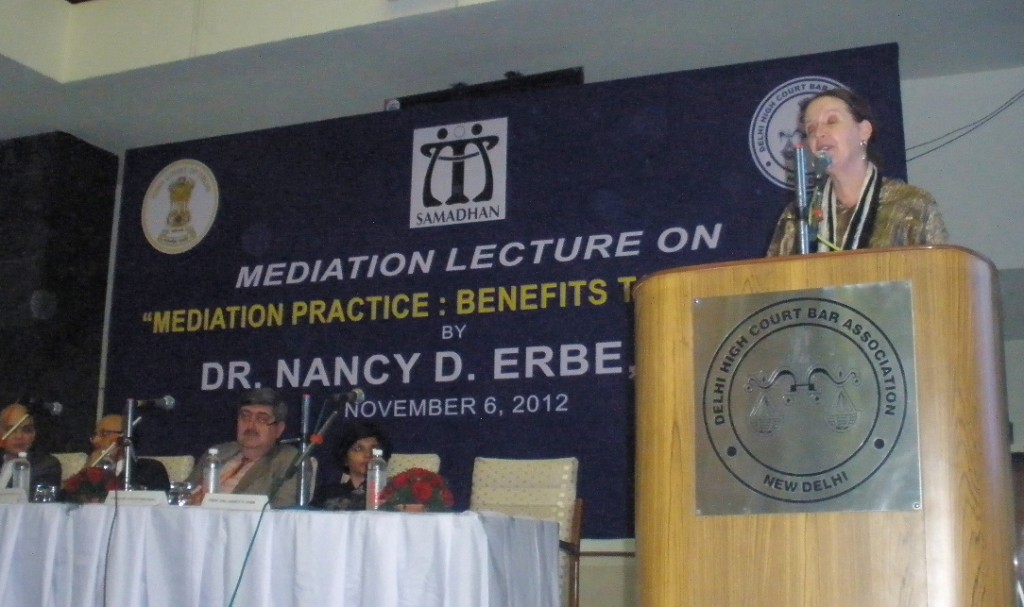Nancy Erbe, professor of negotiation, conflict resolution and peacebuilding (NCRP) at California State University, Dominguez Hills, has been awarded the 2014-2015 Fulbright-PUC (Pontifícia Universidade Católica) Rio de Janeiro Distinguished Chair in American Studies.
 The highest level of Fulbright, the distinguished chair is most often awarded in the STEM (science, technology, engineering and mathematics) fields, and only one has been awarded this year in American Studies for Brazil. Out of 8,000 total grants awarded each year by the Fulbright Scholar Program, of which 800 are Scholar Fulbright awards, Erbe was among the 38 distinguished chairs.
The highest level of Fulbright, the distinguished chair is most often awarded in the STEM (science, technology, engineering and mathematics) fields, and only one has been awarded this year in American Studies for Brazil. Out of 8,000 total grants awarded each year by the Fulbright Scholar Program, of which 800 are Scholar Fulbright awards, Erbe was among the 38 distinguished chairs.
“Receiving this award means so many different things. That the committee selected by President Obama and Brazilian academics who have never met me are recognizing lifetime work inspiring a rich global multicultural community–children/youth, women, those in war torn societies, the incarcerated, and indigenous people–and finding ways to catalyze justice against all odds where it most matters means that at prestigious academic levels the victims of this injustice, my students, and this work still matters,” Erbe commented.
As a representative of the U.S., Fulbright scholars are tasked with enhancing mutual understanding between people of U.S. and the host country, Brazil in this case. The vice dean at PUC-Rio wrote in support of Erbe’s Fulbright application that the CSU Dominguez Hills professor, whose expertise includes multicultural mediation, “will be vital to a Mediation Center that we are creating with the support of Norway.”
Erbe said multicultural mediation is particularly important in this region of the world as the U.S. develops its relationship with Brazil, one of the BRICS (Brazil, Russia, India, China and South Africa) countries, which are considered emerging global powers.
Erbe will design the master courses she will be teaching at that university, and said she will likely incorporate material from courses she has taught at CSU Dominguez Hills, including negotiation tactics, intercultural conflict, and peacebuilding, and those she has developed, such as restorative justice and peacebuilding and ethics of conflict resolution, which align with the award’s focus on social inequalities, international relations and urban studies. To determine exactly what the courses will cover, however, she plans to analyze the needs of the students.
“The best of teaching and learning starts with assessing students’ needs. That’s actually the best of NCRP, too. It’s always a work in progress, a dialog,” said Erbe, who describes her focus as inclusive multicultural democratic process.
Erbe will be teaching courses in international mediation and international conflict resolution to graduate students at PUC-Rio’s International Mediation Center, which was established by Norway’s embassy in Rio de Janeiro.
“Peacebuilding encompasses power dynamics within multicultural process. Mediation is when a third party does not have a direct interest,” she explained. “At the political level this is really tricky. … So who is that trusted outside person? Who’s there to ensure a quality negotiation, a just process? That is what I’m teaching, how to do that, how to be that facilitator of conflict process in a way that’s fair to all, which is rare. … But for our current global community it has to happen.”

Since authoring several publications, from her first workbook, “Holding These Truths: Empowerment and Recognition in Action: Interactive Case Study Curriculum for Multicultural Dispute Resolution” (University of California Press, 2003) to her latest two-volume reference book, “Consumer Survival: An Encyclopedia of Consumer Rights, Safety and Protection” (ABC-CLIO, November 2013), Erbe has infused real-world experiences into her writing as well as her teaching.
Erbe said she sees her assignment at PUC-Rio as another opportunity to not only bring real-world experience to the classroom but also to apply what she learns from her experience in Brazil to her teaching at CSU Dominguez Hills and to her role as a member of the university’s Internationalization Task Force established by University President Willie J. Hagan in March 2013.
The distinguished chair position is not Erbe’s first Fulbright experience. For a fourth year she was selected as a reviewer for the Peace and Conflict Resolution Peer Review Committee for the Fulbright Specialist Program by the Council for International Exchange of Scholars for 2013-14 after visiting Cyprus as a Fulbright Senior Specialist in 2009.
A Portsmouth, Va. native raised in Milwaukee, Wis., Erbe earned a bachelor’s in non-profit administration from Metropolitan State University in St. Paul, Minn. There she participated in internships including a high-impact, service-learning project in which she was invited to be the guest of a migrant farm-working family living in housing projects.
Erbe went on to accept a position to direct a legal aid clinic representing underprivileged clients in abusive situations (and receive the Wennerstrom award for outstanding service) and to serve as an editor for the journal for law and inequality while she attended law school and published her first article on human trafficking that has since been translated and disseminated by the United Nations.
Although she was accepted into Cornell University Law School in Ithaca, New York, she opted to attend University of Minnesota School of Law in Minneapolis in order to avoid “crushing student debt.” At that university she earned her Juris Doctorate, cum laude. She went on to earn her Master of Laws degree from the Straus Institute for Dispute Resolution at Pepperdine School of Law, in Malibu, after being a visiting faculty scholar teaching dispute resolution and education and prior to joining the faculty at CSU Dominguez Hills in 2004.

In one of the early occasions that would lay the groundwork for her Fulbright assignment in Brazil, in years 2000 and 2001 she taught students from war-torn countries including Cameroon, Cuba, Ethiopia, Guatemala, Israel, Mexico, Peru and Zimbabwe with the Peace Research Institute in Norway at the University of Oslo (UO) International Summer School. Norway’s Nansen Institute also asked her to help them facilitate cross ethnic dialogue during the Balkans war.
She has been a member of the faculty at the University of Denver and University of California, Berkeley, where with support from the Hewlett Foundation she developed and piloted curriculum in multicultural conflict resolution, and from 1999 to 2002 was the first director of the Rotary Center for International Studies in Peace and Conflict Resolution.
Erbe started mediating child welfare cases with the Minneapolis American Indian Center as she was ending her litigation practice in 1987-89 with Fredrickson and Byron, where she represented education, health care, small business, real estate, family, and entertainment law clients including R&B duo Jimmy Jam and Terry Lewis.
Before starting a full-time alternative dispute resolution practice in 1995, she was asked to lead a treatment team for violent female juvenile offenders and develop a national no-violence curriculum for middle school funded by the Department of Justice.
Her mediation and conflict resolution clients include the U.S. Office of the Interior, U.S. Office of Personnel, Colorado State Commission on Indian Affairs, Colorado State Department of Corrections, Bay Area Rapid Transit, City of Boulder Human Relations Commission, Wu Yee Children’s Services, and County of Los Angeles.
Erbe commented that the progression and evolution of her education and career makes the honor of being named Fulbright distinguished chair particularly meaningful and that the opportunity will further transform and enhance her teaching journey.
“I believe we are born with divine gifts, and with encouragement, we can discover great vision, purpose, potential. That’s a big part of what I try to do for the students at CSU Dominguez Hills and around the world,” she said.